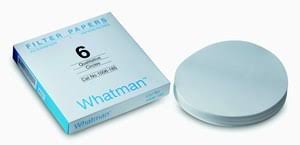Cellulose filters are used in qualitative analytical techniques to determine and identify materials.
Prepleated qualitative filters are available, which give improved flow rate and increased loading capacity compared to equivalent flat filters.
10 in stock
Grade 6: 3 μm*
Twice as fast as Grade 5 with similar fine particle retention.
Often specified for boiler water analysis applications.
Rs.1,642.50 Rs.2,190.00
Cellulose filters are used in qualitative analytical techniques to determine and identify materials.
Prepleated qualitative filters are available, which give improved flow rate and increased loading capacity compared to equivalent flat filters.
| Variation Codes | 1006-090 |
|---|
Grade GF/C: 1.2 μm*
Combines fine particle retention with good flow rate.
The standard filter in many
parts of the world for the collection of suspended solids in potable water and natural
and industrial wastes.
Fast and efficient clarification of aqueous liquids containing
low to medium levels of fine particulates.
Widely used for cell harvesting, liquid scintillation counting, and binding assays where more loading capacity is required.
Grade 3: 6 μm, (Medium flow, thick filter paper)
Double the thickness of Grade 1 with still finer particle retention and excellent loading capacity; more precipitate can be held without clogging.
The extra thickness gives increased wet strength and makes this grade highly suitable for use in Büchner funnels.
The high absorbency is particularly valuable when the paper is used as a sample carrier.
Grade 5: 2.5 μm*
The maximum degree of fine particle filtration in the qualitative range.
Capable of retaining the fine precipitates encountered in chemical analysis.
Slow flow rate.
Excellent clarifying filter for cloudy suspensions and for water and soil analysis.
Also available prepleated as Grade 5V.
Nuclepore track-etched polycarbonate membranes are manufactured from high-quality polycarbonate film and have sharply defined pore sizes, high flow rates, and excellent chemical and thermal resistance.
The membranes have a smooth flat surface and exhibit very low levels of extractables.

There are no reviews yet.